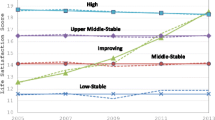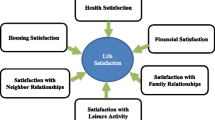Abstract
The aim of the study was to explore the relationship between subjective economic status and indicators of successful aging to life satisfaction trajectories among the elderly in Taiwan. Data were from the four waves of “Survey of Health and Living Status of the Elderly in Taiwan”. Hierarchical linear modeling was conducted. Subjective economic status was measured by childhood economic status and time-varying economic satisfaction. Time-varying physical, mental, and social successful aging variables and demographics were also used to describe the trajectory of life satisfaction. Life satisfaction showed a slightly decreasing but generally stationary trend across time. The concurrent economic satisfaction was associated with life satisfaction trajectory, but childhood economic status was not significant. The time-varying depressive symptoms, cognitive function and social support were related to the life satisfaction trajectory. Policy on the elderly should take particular account of the economic security, mental health, and social support of the elderly.
Similar content being viewed by others
References
Ball, R., & Chernova, K. (2008). Absolute income, relative income, and happiness. Social Indicators Research, 88, 497–529.
Berg, A. I., Hassing, L. B., McClearn, G. E., & Johansson, J. (2006). What matters for life satisfaction in the oldest-old? Aging & Mental Health, 10(3), 257–264.
Borg, C., Hallberg, I. R., & Blomqvist, K. (2006). Life satisfaction among older elderly (65 +) with reduced self-care capacity: The relationship to social, health and financial aspects. Journal of Clinical Nursing, 15, 607–618.
Carmel, S., & Bernstein, J. H. (2003). Gender differences in physical health and psychosocial well being among four age-groups of elderly people in Israel. International Journal of Aging and Human Development, 56(2), 113–131.
Caspi, A., & Elder, G. H., Jr. (1986). Life satisfaction in old age: Linking social psychology and history. Journal of Psychology and Aging, 1(1), 18–26.
Chen, C. (2001). Aging and life satisfaction. Social Indicators Research, 54(1), 57–79.
Cheng, S.-T., & Chang, A. C. M. (2006). Relationship with others and life satisfaction in later life: Do gender and widowhood make a difference? Journal of Gerontology Series B, Psychological Sciences and Social Sciences, 61B(1), P46–P53.
Chipperfield, J. G., & Havens, B. (2001). Gender differences in the relationship between marital status transitions and life satisfaction in later life. Journal of Gerontology Series B, Psychological Sciences and Social Sciences, 56B(3), P176–P186.
Chou, K.-L., & Chi, I. (2002). Financial strain and life satisfaction in Hong Kong elderly Chiense: Moderating effect of life management strategies including selection, optimization, and compensation. Aging & Mental Health, 6(2), 172–177.
Council for Economic Planning, Development, R.O.C. (2008). Population projection in Taiwan areas: 2008–2056. Taiwan: Council for Economic Planning and Development, Executive Yuan.
Dannefer, D. (2003). Cumulative advantage/disadvantage and the life course: Cross-fertilizing age and social science theory. Journal of Gerontology Series B, Psychological Sciences and Social Sciences, 58B(6), S327–S337.
Diener, E., Oishi, S., & Lucas, R. E. (2003). Personality, culture, and subjective well-being: Emotional and cognitive evaluation of life. Annual Review of Psychology, 54, 403–425.
Diener, E., Sandvik, E., Seidlitz, L., & Diener, M. (1993). The relationship between income and subjective well-being: Relative or absolute? Social Indicators Research, 28(3), 195–223.
Directorate-General of Budget, Accounting and Statistics, Executive Yuan, Taiwan, R.O.C. (2009). GNP Growth rate, 2009 forecast. http://www.dgbas.gov.tw/ct.asp?xItem=23888&ctNode=2800.
Easterlin, R. A., & Plagnol, A. C. (2008). Life satisfaction and economic conditions in East and West Germany pre- and post- unification. Journal of Economic Behavior & Organization, 68, 433–444.
Ferraro, K. F., & Shippee, T. P. (2009). Aging and cumulative inequality: How does inequality get under the skin? The Gerontologist, 49(3), 333–343.
Fry, P. S. (2001). Predictors of health-related quality of life perspectives, self-esteem, and life satisfaction of older adults following spousal loss: An 18-month follow-up study of widows and widowers. The Gerontologist, 41(6), 787–798.
Fujita, F., & Diener, E. (2005). Life satisfaction set point: Stability and change. Journal of Personality and Social Psychology, 88(1), 158–164.
Gerstorf, D., Ram, N., Röcke, C., Lindenberger, J., & Smith, J. (2008). Decline in life satisfaction in old age: Longitudinal evidence for links to distance-to-death. Psychology and Aging, 23(1), 154–168.
Howell, R. T., & Howell, C. J. (2008). The relation of economic status to subjective well-being in developing countries: A meta-analysis. Psychological Bulletin, 134(4), 536–560.
Hox, J. (2002). Multilevel analysis: Techniques and applications (pp. 20–21). New York: Psychological Press, Taylor & Francis Group.
Hsu, H. C. (2007). Exploring Elderly people’s perspective on successful ageing in Taiwan. Ageing & Society, 27(1), 87–102.
Hsu, H. C. (2009). Physical function trajectories, depressive symptoms, and life satisfaction among the elderly in Taiwan. Aging & Mental Health, 13(2), 202–212.
Kleinspehn-Ammerlahn, A., Kotter-Grühn, D., & Smith, J. (2008). Self-perceptions of aging: Do subjective age and satisfaction with aging change during old age? Journal of Gerontology Series B, Psychological Sciences and Social Sciences, 63B(6), P377–P385.
Kohout, F. J., Berkman, L., Evans, D. A., & Huntley, J. C. (1993). Two shorter forms of the CES-D Depression Symptom Index. Journal of Ageing and Health, 5, 179–193.
Krause, N. (2003). Religious meaning and subjective well-being in late life. Journal of Gerontology Series B, Psychological Sciences and Social Sciences, 58B(3), S160–S170.
Krause, N. (2004). Lifetime trauma, emotional support, and life satisfaction among older adults. The Gerontologist, 44(5), 615–623.
Li, Y., Aranda, M. P., & Chi, I. (2007). Health and life satisfaction of ethnic minority older adults in mainland China: Effects of financial strain. International Journal of Aging and Human Development, 64(4), 361–379.
Li, L. W., & Liang, J. (2007). Social exchange and subjective well-being among older Chiense: Does age make a difference? Psychology and Aging, 22(2), 386–391.
Miyazaki, Y., & Raudenbush, S. W. (2000). Tests for linkage of multiple cohorts in an accelerated longitudinal design. Psychological Methods, 5, 44–63.
Mroczek, D. K., & Sprio, A., I. I. I. (2005). Change in life satisfaction during adulthood: Findings from the Veterans Affairs Normative Aging Study. Journal of Personality and Social Psychology, 88(1), 189–202.
Neugarten, B. I., Havighurst, R. J., & Tobin, S. S. (1961). The measurement of life satisfaction. Journal of Gerontology, 16, 134–143.
North, R. J. N., Holahan, C. J., Moos, R. H., & Cronkite, R. C. (2008). Family support, family income, and happiness: A 10-year perspective. Journal of Family Psychology, 22(3), 475–483.
Pearlin, L. I., & Skaff, M. M. (1996). Stress and the life course: A paradigmatic alliance. The Gerontologist, 36(2), 239–247.
Pfeiffer, E. (1975). A short portable mental status questionnaire for the assessment of organic brain deficit in elderly patients. Journal of American Geriatric Society, 23(10), 433–441.
Pinquart, M., & Schindler, I. (2007). Changes of life satisfaction in the transition to retirement: A latent-class approach. Psychology and Aging, 22(3), 442–455.
Pinquart, M., & Sörensen, S. (2001). Gender differences in self-concept and psychological well-being in old age: A meta-analysis. Journal of Gerontology Series B, Psychological Sciences and Social Sciences, 56B(4), P195–P213.
Rabbitt, P., Lunn, M., Ibrahim, S., Cobain, M., & McInnes, L. (2008). Unhappiness, health and cognitive ability in old age. Psychological Medicine, 38, 229–236.
Radloff, L. S. (1977). The CES-D scale: A self-reported depression scale for research in the general population. Applied Psychological Measurement, 1, 385–401.
Röcke, C., & Lachman, M. E. (2008). Perceived trajectories of life satisfaction across past, present, and future: Profiles and correlates of subjective change in young, middle-aged, and older adults. Psychology and Aging, 23(4), 833–847.
Rowe, J. W., & Kahn, R. L. (1997). The structure of successful aging. In J. W. Rowe & R. L. Kahn (Eds.), Successful aging (pp. 36–52). New York: Dell.
Ruthig, J. C., & Chipperfield, J. G. (2006). Health incongruence in later life: Implications for subsequent well-being and health care. Health Psychology, 26(6), 753–761.
Ryff, C. D. (1982). Successful aging: A developmental approach. The Gerontologist, 22(2), 209–214.
Silverstein, M., Chong, Z., & Li, S. (2006). Intergenerational transfers and living arrangements of older people in rural China: Consequences for psychological well-being. Journal of Gerontology Series B, Psychological Sciences and Social Sciences, 61B(5), S256–S266.
SPSS Inc. (2005). Linear mixed-effects modeling in SPSS: An introduction to the MIXED procedure. Chicago: SPSS Inc.
Tao, H.-L., & Chiu, S.-Y. (2009). The effects of relative income and absolute income on happiness. Review of Developmental Economics, 13(1), 164–174.
Warr, P., Butcher, V., Robertsonk, I., & Callinan, M. (2004). Older people’s well-being as a function of employment, retirement, environmental characteristics and role preference. British Journal of Psychology, 95, 297–324.
Yamaoka, K. (2008). Social capital and health and well-being in East Asia: A population-based study. Social Science and Medicine, 66, 885–899.
Author information
Authors and Affiliations
Corresponding author
Rights and permissions
About this article
Cite this article
Hsu, HC. Trajectory of Life Satisfaction and its Relationship with Subjective Economic Status and Successful Aging. Soc Indic Res 99, 455–468 (2010). https://doi.org/10.1007/s11205-010-9593-8
Accepted:
Published:
Issue Date:
DOI: https://doi.org/10.1007/s11205-010-9593-8




